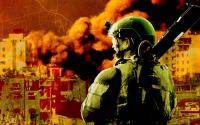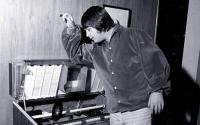Common Dreams / Published on Wednesday, September 17, 2003 by the New York Timesby Douglas Jehl with David E Sanger
WASHINGTON, Sept. 16 — New intelligence assessments are warning that the United States' most formidable foe in Iraq in the months ahead may be the resentment of ordinary Iraqis increasingly hostile to the American military occupation, Defense Department officials said today.
That picture, shared with American military commanders in Iraq, is very different from the public view currently being presented by senior Bush administration officials, including Defense Secretary Donald H. Rumsfeld, who once again today listed only "dead-enders, foreign terrorists and criminal gangs" as opponents of the American occupation.
The defense officials spoke on condition of anonymity, saying they were concerned about retribution for straying from the official line. They said it was a mistake for the administration to discount the role of ordinary Iraqis who have little in common with the groups Mr. Rumsfeld cited, but whose anger over the American presence appears to be kindling some sympathy for those attacking American forces.
Other United States government officials said some of the concerns had been prompted by recent polling in Iraq by the State Department's intelligence branch. The findings, which remain classified, include significant levels of hostility to the American presence. The officials said indications of that hostility extended well beyond the Sunni heartland of Iraq, which has been the main setting for attacks on American forces, to include the Shiite-dominated south, whose citizens have been more supportive of the American military presence but have also protested loudly about raids and other American actions.
As reasons for Iraqi hostility, the defense officials cited not just disaffection over a lack of electricity and other essential services in the months since the war, but cultural factors that magnify anger about the foreign military presence.
"To a lot of Iraqis, we're no longer the guys who threw out Saddam, but the ones who are busting down doors and barging in on their wives and daughters," one defense official said.
However, Condoleezza Rice, President Bush's national security adviser, took issue with the assertion of broad Iraqi dissatisfaction with the presence of American troops, declaring that the United States was making headway in the places like Baghdad and Tikrit, where much of the resistance is centered.
"But there is, even in that part of the country, progress," she said in an interview. "People finished their university exams, the Iraqi symphony orchestra performed and took a tour up to the north. Kids went to school."
Some American officials said the intelligence assessments underscored that opposition to American forces in Iraq was likely to get worse before it got better. Others cautioned that it was risky to make such forecasts, and some cited what they called indicators of recent improvements in the security situation.
But while President Bush and other senior administration officials have described the conflict in Iraq primarily as a battleground in the war on terrorism, the officials said, the recent intelligence assessments tend to cast it mainly as an insurgency in which the key variable will be the role played by ordinary Iraqis.
"As time goes on, if the infrastructure doesn't improve, and American troops are still out there front and center, it's hard to see the public mood getting any better," one United States government official said.
A military official who acknowledged the existence of the pessimistic intelligence assessments said he took issue with some of the conclusions. He said the bounties being offered in Iraq for attacks on Americans had increased recently, to as much as $5,000, in what he called an indication that those opposed to the American occupation were having a harder time enlisting support.
The official also declared that the number of intelligence tips and other useful information provided to American forces in Iraq was generally on the increase, a sign, he said, of increasing cooperation by large segments of the Iraqi public.
To help blunt the anger directed at the American-led occupying force, Mr. Rumsfeld said again today, the United States hopes to accelerate the hand-over of security responsibilities in Iraq to Iraqi police officers, border guards, civil defense forces and soldiers trained by the United States. Nearly 60,000 Iraqis are now in uniform, he told reporters at a Pentagon briefing, and the administration hopes to increase that number to about 70,000 soon, to include more than 10,000 former Iraqi soldiers who are being trained to join the new civil defense force.
But the assassination of a high-ranking Iraqi police official on Monday has highlighted the difficulty involved in the effort, including the danger that Iraqis working with American forces will become targets as collaborators, the defense officials said.
Today, some Defense Department officials said the role played by foreign extremists, including members of the Lebanese resistance group Hezbollah, remained a source of increasing concern.
The largest recent indicator of foreign involvement came last week, they said, when American military forces detained some 80 foreign fighters, including Saudis, Jordanians and Sudanese, who were rounded up along with money and weapons in two separate raids conducted by the 101st Air Assault Division near the Saudi border.
But they said the degree to which such fighters, along with loyalists to the former Iraqi leader, were finding support within the Iraqi population was making it difficult for American forces to track them down and root them out.
Ms. Rice said that it was "simply naïve" to believe that Iraq today was more of a haven for terrorists than it was before Saddam Hussein was ousted from power.
"There is almost a sense that they were sitting someplace minding their own business — drinking tea, having meetings" and then decided to come to Iraq only after the American military rolled into Baghdad.
"These are fighters, they are jihadists," she said. "They would be fighting someplace. Maybe they would be fighting in the Gulf. Maybe they would be fighting in Southeast Asia. Maybe they would be fighting, or trying to fight, in the United States."
For much of the summer, as attacks on American forces in Iraq continued, Mr. Rumsfeld and other Pentagon officials disputed the idea that the United States was facing a guerrilla war in Iraq. They stopped objecting to that label only after Gen. John P. Abizaid, the new commander of American forces in the region, publicly called the conflict a "classical guerrilla-type campaign."
With American forces making up a vast majority of the coalition now occupying Iraq, Mr. Rumsfeld and General Abizaid have publicly acknowledged that the overwhelmingly American flavor of the effort poses a military problem because it makes the United States the target of ordinary Iraqis' resentment.
But barring a speedy withdrawal of American forces from Iraq, which the administration has ruled out, the recent intelligence assessments give little reason to expect that the resistance will calm down soon, the defense officials said. "It's going to be a hard slog, and it's hard to see when or if the picture is going to get any brighter," one official said.
More than 70 American military personnel have been killed by hostile fire in Iraq since May 1, when the administration declared an end to major combat operations.






